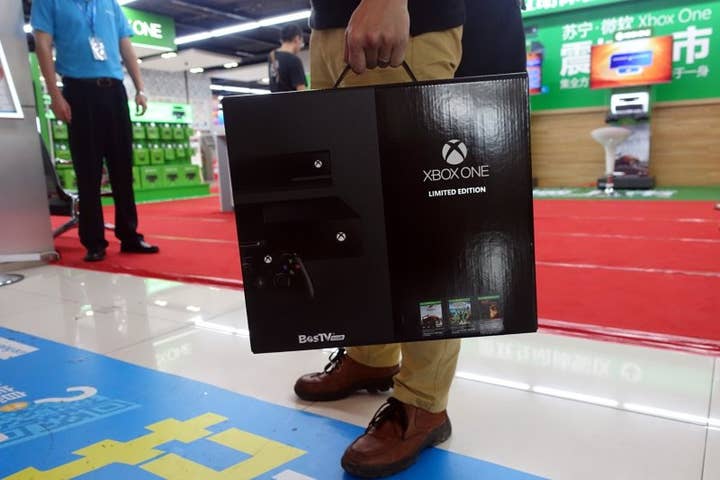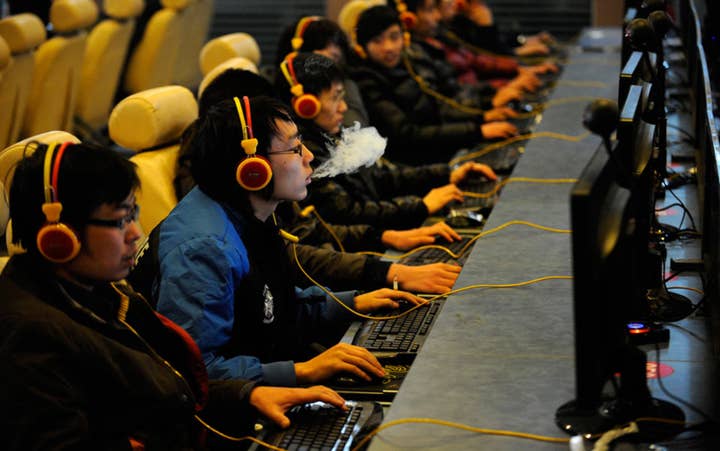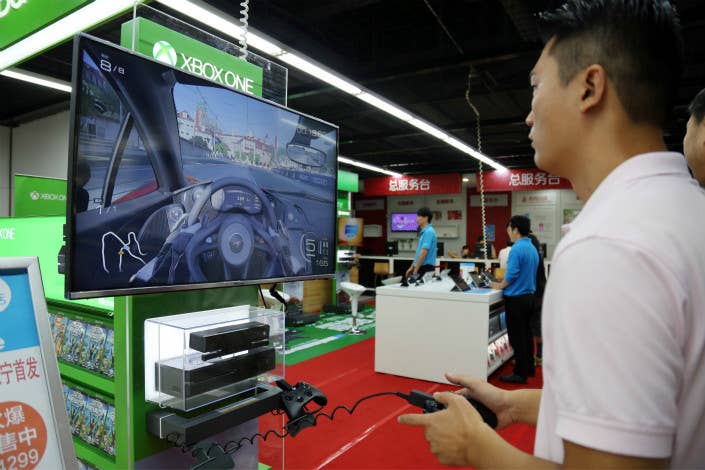Five misconceptions about the Chinese games market
Apptutti's Daniel Camilo on the myths around console sales, PC gaming, rampant piracy, and more
No matter how much China's economy grows and how much media exposure it gets from around the globe, the country is still shrouded by a thick layer of mystery and misconceptions that generate confusion in the eyes of those looking in from the outside. Analysts and "China observers" constantly report and comment about China, more often than not based on "official sources and data" but little to no real contact on the ground. This (among many other reasons, which I won't get into here) leads to China existing in almost two parallel realities: the official one based on data, numbers and policies, and the practical reality that is actually lived in the country (the correlation between the two is not always as linear as one could assume).
Having lived in China for the most part of the last 11 years of my life, not a day goes by without reading some random international news article that wrongfully reports about China. In particular for the gaming industry, even though China is by many metrics the biggest gaming market in the world, some outdated and/or downright wrong notions still prevail. Hopefully I'll be able to clear at least some of these misconceptions here, based on my own experience mostly, but also relevant data and sources. In no particular order...
1. "There are no game consoles in China"
Yes there are. Lots and lots.
"Even though China is by many metrics the biggest gaming market in the world, some outdated and downright wrong notions still prevail"
This is one of the biggest misconceptions most people have about gaming in China, and no matter how much is written on the subject, confusion and misinformation are still rampant. The console gaming market in China is a perfect example of the dichotomy between the "official" and the "real."
Are there gaming consoles in China? Yes, by the millions, I estimate. Are official sales numbers for gaming consoles in China high? No, they are downright abysmal, actually. Why? Simply because virtually nobody in China buys gaming consoles through official channels and/or officially licensed models.
Speaking only of current generation consoles (but this also applies to older ones, in some ways), both Microsoft and Sony officially launched the Xbox One and PlayStation 4 in China, and Nintendo is about to launch the Switch. The problem is, the Switch is super late to the party, the Chinese Xbox One is region-locked and hyper-restrictive, and the Chinese PS4, while not completely region locked, still has some restrictions.
Basically, the average consumer in China has no good reason to buy an officially launched console in China when it has import models widely available in most e-commerce platforms (online shopping in China is dominant like nowhere else in the world), and even grey-market stores that can easily be found in most cities across the country. So while Nintendo is about to officially launch the Switch in China, in reality the Switch has been played in the country since its global launch, and can often be seen in the hands (and households) of Chinese gamers. Same goes for the Xbox One, and even more so for the PS4 (probably the most popular console in the country, currently).

The same thing applies to game sales. Buying games on Taobao, the biggest e-commerce platform in China for individual consumers, is as easy as buying water, and all games that one can think of can be found there. Personally, I buy all my games on Taobao, and they usually take less than 24 hours to reach my house when I order from a shop located in my city.
So how many consoles are there in China? Well, that's the thing, isn't it? Most game consoles sold in the country are imported models (from Hong-Kong, but also Japan and even the USA), so it's almost impossible to get accurate numbers, and I'm not aware of any rigorous reporting on this. However, I do strongly believe we are looking at millions, maybe tens of millions -- maybe somewhere between 5 and 15 million consoles from the current main three, I estimate.
2. "PC gaming is king"
No, not anymore. Mobile gaming is.
"While Nintendo is about to officially launch the Switch in China, in reality the Switch has been played in the country since its global launch"
For many, when imagining gaming in China, what comes to mind are decadent and sweaty internet cafes with rows of desktop computers filled with teenagers and young adults playing some random MMOs, Counter-Strike clones, or even Starcraft. While this was true not too long ago (and such internet cafes do still exist), things have drastically changed in the last few years.
Since smartphones became mainstream, PC gaming took a deep dive in China. Yes, PC gaming is still huge in the country, but nowhere near as mobile gaming is. Almost everyone in China plays on their smartphones; men, women, non-binary, children, teenagers, adults and seniors. More than anywhere else in the world, gaming in China truly is mainstream and prevalent across all demographics. Plus, there's not much stigma attached to gaming here -- for casual gaming at least, generally speaking. People will often publicly share screenshots from their gaming sessions in their social media, just as much as they share about their work and family.
PC gaming is still important, with Tencent's WeGame and Valve's Steam stores and its many discounted sales being very popular among Chinese gamers, but comparatively speaking it's more of a niche (even if it's a huge niche). Also, in the last couple of years the PC gaming landscape has been tumultuous, with Steam facing some disruptions and Tencent (and government) increasingly showing signs that the days of foreign virtual marketplaces in China are numbered.
It's worth mentioning that piracy is still a big problem for PC gaming in China (and elsewhere, of course), but not as much as it was years ago before all these virtual stores existed. Which leads me to the next misconception...

3. "Everything in China is pirated"
Not really, no. Not so much anymore, anyway.
One of the consequences of gaming becoming mainstream and played across most demographics (as mentioned before) is that a lot of these new (hundreds of millions of) consumers are not very tech savvy and don't really know how to pirate content -- and/or aren't even aware of it, and/or won't even bother to do so because they have enough disposable income.
In 2018, mobile gaming in China already generated almost $40 billion, and it's still growing. Most of this money comes from casual free-to-play games riddled with microtransactions. People spend ridiculous amounts of money in these games. The PC situation is fairly similar, with the rise in popularity of virtual game stores (like Steam) weeding out pirates and fostering the growth of more "sophisticated" users, more willing to spend money on digital goods.
Piracy will never go away, but it is not a determining factor when it comes to the growth of the Chinese gaming market and industry. Trends have changed.
4. "Chinese consumers are not familiar with classic franchises"
Yes, and no.
Much to the chagrin of Disney, Chinese consumers simply don't care about Star Wars. Most didn't grow up watching the first trilogy, and the nostalgia/fanbase simply isn't there. The movies have been flopping at the Chinese box-office. This created an assumption that the situation is similar regarding other popular non-Chinese franchises and brands, but that isn't necessarily the case.
While the Star Wars case is real, many other globally popular IPs are also popular in China, and to assume otherwise just because of some specific cases is, at the very least, risky business. Generalisations are a dangerous thing.

Many classic gaming IPs are extremely popular in China, including some that became popular even while not being officially released in the country. Resident Evil immediately comes to mind, and anyone visiting China is bound to see cars sporting "Umbrella Corp." stickers as decoration. That's just one anecdotal example of a banned IP that is hugely popular anyway, among too many others to list here. Most well established franchises from Nintendo, Sega, PlayStation, Capcom, Konami, Tecmo (etc, etc) are as popular in China as most other places on Earth. And in some particular cases, even more popular in China, especially for some key Japanese ones.
So yes, Chinese consumers, and gamers in particular, are very much aware of a wide range of pop culture references, and to assume Chinese audiences would require a special introduction/education about popular franchises could potentially be a gigantic faux-pas, not only resulting in a waste of resources, but also potentially insulting and alienating the market.
5. "China doesn't create any games."
China probably creates more games than any other country.
Tencent is the biggest games company on the planet, developing and publishing games and constantly buying up new studios, IPs and stakes in national and foreign companies. But Tencent is just the most visible part from the tip of a huge iceberg. Hundreds (probably thousands) of game development studios and publishing houses exist in China, not to mention foreign companies that also have offices and studios in the country (like Ubisoft, EA, Bandai Namco, 505 Games, Activision, and many many others).
Perhaps the main reason why people outside of China still don't see the country as a powerhouse in game development is because China didn't manage to successfully export big games to the rest of the world -- at least not in a way that made people clearly aware of the content's origin. But even that is changing; as I write this piece, Tencent and Next Studios announced a new AAA game (Synced: Off-Planet), and soon the PS4 and PC will welcome Monkey King: Hero is Back, arguably the first big budget Chinese console game to be released in the West.
It's worth mentioning that while countless Chinese studios develop games (mostly mobile games), a huge portion of the content created is heavily inspired (complete rip-offs, really) by existing IPs; clones of clones of clones of established games, shamelessly using stolen assets. This makes it hard for these games to be exported, and therefore the vast majority are consumed by Chinese gamers only.
There are many ways to explain the culture of copy-cats in game development in China, but I would like to point out one reason in particular that, while not excusing the exploitation of someone else's assets, does offer a rationale for the practices.
Due to the well known, draconian regulations imposed by the Chinese government on media content, most foreign games are banned from officially being published in China. While most console and PC games can for the most part easily find their ways to the hands of Chinese consumers, mobile games in Chinese app stores don't have much space to hide from regulators. Therefore, only the most resourceful users will bother to directly download the APKs of foreign games to play in their smartphones (and then will find it almost impossible to play online with their friends due to the Great Firewall of China and lack of online support for most non-Chinese online games). This leads to many developers simply trying to create their own versions of existing foreign games.
Again, this is just one (obvious) reason. There's no point in detailing too many here, but needless to say a very "loose" copyright culture and national protective laws and regulation are a few other clear factors to take into account.
So yes, China does produce many games. Likely more than any other country in the world, actually. They just aren't being released outside of the country and therefore most people aren't aware of them.
Daniel Camilo lives in Shenzhen. He is the overseas business developer for Apptutti, a specialist in publishing games in China.
